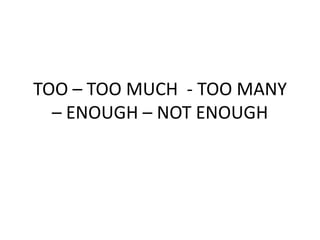
Too – too much too many –
- 1. TOO – TOO MUCH - TOO MANY – ENOUGH – NOT ENOUGH
- 2. TOO – TOO MUCH - TOO MANY – ENOUGH – NOT ENOUGH • TOO : demasiado. Siempre va delante de adjetivos y/o adverbios. Ejemplo: It's too cold today: Hoy hace demasiado frío hoy. • TOO MUCH: demasiado/demasiada. Utilizamos esta forma delante de nombres en SINGULAR. Ejemplo: There is too much cheese in the fridge: Hay demasiado queso en el frigorífico. There is too much snow in the street: Hay demasiada nieve en la calle. TOO MANY: demasiados/demasiadas. Se utiliza siempre delante de nombres en PLURAL. Ejemplo: There are too many chairs in the room: hay demasiadas sillas en la habitación. Don't eat too many sweets: No comas demasiados caramelos.
- 3. TOO ENOUGH Too & Enough 1. TOO Too se traduce al español por “demasiado”, “más de lo necesario”. Too se puede usar en frases con varias estructuras: • Con “much” o “many” delante de sustantivos too much / too many + sustantivos o There is too much noise here o You make too many mistakes • . ENOUGH Enough se traduce al español por “suficiente”, “la cantidad necesaria”. Enough se puede usar en frases con varias etructuras: • Delante de sustantivos (not) enough + sustantivos o We wanted to play football but we didn’t have enough players o Is there enough sugar in your coffee? • Detrás de adjetivos (que no acompañen a
- 4. 1.- Write in the blanks too, too much, too many. Escribe en los huecos too, too much, too many. - The baby is drinking __________ water. - Summer in the South of Spain is ________ hot. - I have done __________ exercises. - This is a very rich woman, she has got ___________ houses. - I'm going to bed right now, I'm _________ tired. - You mustn't say that this job is _______ easy. - There are _________ cars here. 2.- Rewrite each sentence using the adverb "enough". Escribe de nuevo cada frase utilizando el adverbio "enough". - It isn't hot to go to the swimming-pool.> - You are intelligent to pass the exam. > - Your friend Lucy is beautiful to be a model. > - I don't have paper to write a long letter. > - Please, buy milk for all of us. > - She hasn't got money to buy a new house. > - You don't speak loud so I can't hear you. >
- 5. ENOUGH: suficiente/suficientemente. Este adverbiose coloca de diferente manera dependiendo de si estamos hablando de un nombre o de un adjetivo. Por lo tanto, lo colocaremos DELANTE de los nombres y DETRÁS de los adjetivos. Ejemplo: The man isn't strong enough: El hombre no es lo suficientemente fuerte. Have you bought enough beer? ¿Has comprado suficiente cerveza?